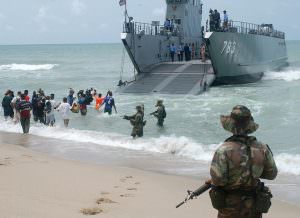It Can Happen Here
Thirty-nine individuals held in U.S. custody at one time or another are unaccounted for -- missing or disappeared in the style of a Third World dictatorship. What have we become?WASHINGTON — There was a time when the dark, political drama was my preferred weekend movie. That was before kids and suburbs and serial viewings of “Shrek.”
The films were almost always about some exotic country gripped in a vise of poverty and dictatorship, where human life is cheap and strongmen unaccountable for crimes that shock the conscience. The genre was popularized in the 1982 film “Missing,” by the master director Costa-Gavras. It was a fictionalized account of the kidnapping and murder of a young American journalist in Chile, and the political awakening that his conservative father and the journalist ‘s wife undergo when they come to understand that the American government refuses to aide their search and somehow appears complicit in the horrors they see unfolding around them.
No matter where these dramas were set — in Latin America or in Africa or the Soviet Union or Northern Ireland — you would leave the theater stunned and silent, for a time. But safe, it seemed, in the knowledge that it could not happen here. Now it has.
It is not only that the United States has swept people off the streets and held them in secret overseas prisons where, by many credible accounts, they were tortured. Now a collaboration of six domestic and international human rights groups has concluded that 39 of those who were in U.S. custody at one time or another since the 9/11 attacks still are unaccounted for. These are not the 14 “high-value detainees” transferred in the past few months to the military penal colony at Guantanamo Bay, Cuba. No one knows where these 39 are — or if they are still alive.
They are missing. Or, in the language of international law, they have undergone a “forced disappearance.”
At some point, the list of the missing included at least three minors — two of them the children of Khalid Sheik Mohammed, mastermind of the 9/11 attacks. “We don’t have any information that the children are still in custody, and I really don’t think they are,” says Joanne Mariner, terrorism and counterterrorism director for Human Rights Watch and one of the authors of the report. Wives also were detained. Their fate also is unknown, Mariner said in an interview, though it is likely they are living among relatives somewhere.
The rights groups compiled the list by examining accounts the United States gave when it acknowledged having a person in custody, eliminating those whose whereabouts later were disclosed. Investigators looked at names some members of Congress had placed in the Congressional Record last year as “terrorists no longer a threat” — though no official definition of that term was given. They reviewed public pronouncements — often made by the Pakistani government — that a terrorism suspect had been turned over to the United States. And they pored over accounts of former detainees who said they’d seen a certain individual while in detention, and compared this account with other bits and pieces of evidence.
It is unknown whether the missing remain in some secret U.S.-run facility, or were transferred to foreign governments whose security apparatuses routinely practice secret detention and torture. It is not known if they are dead or alive.
The U.S. government gave the researchers an “absolute non-response” Mariner says, just a pro-forma letter with printouts from the “war on terror” section of the White House Web site attached. CIA spokesman Paul Gimigliano said in an e-mail that “when it comes to the CIA and the fight against terror, there’s no shortage of inaccurate allegations.” He would not comment when asked if he believes the report is inaccurate, pointing to a Freedom of Information Act lawsuit the groups have filed.
The United States, meanwhile, has declined to sign a new U.N. convention against forced disappearances. It would require countries to enforce victims’ rights and penalize disappearances carried out by agents of a state. Somehow, we have come to expect this moral hollowness from our government. But we object — loudly, relentlessly, and with saber ready — when such state-sponsored depravity is applied to one of our own.
“How would we feel if it were done to an American?” asks Tom Malinowski of the Human Rights Watch Washington office. “If the North Korean government or the Iranian government took custody of an American and transferred him to the custody of their intelligence agency?”
The plotline would have the makings of a Hollywood blockbuster. And my guess is the line would stretch down the block.
Marie Cocco’s e-mail address is mariecocco(at symbol)washpost.com.
© 2007, Washington Post Writers Group
Your support matters…Independent journalism is under threat and overshadowed by heavily funded mainstream media.
You can help level the playing field. Become a member.
Your tax-deductible contribution keeps us digging beneath the headlines to give you thought-provoking, investigative reporting and analysis that unearths what's really happening- without compromise.
Give today to support our courageous, independent journalists.






You need to be a supporter to comment.
There are currently no responses to this article.
Be the first to respond.